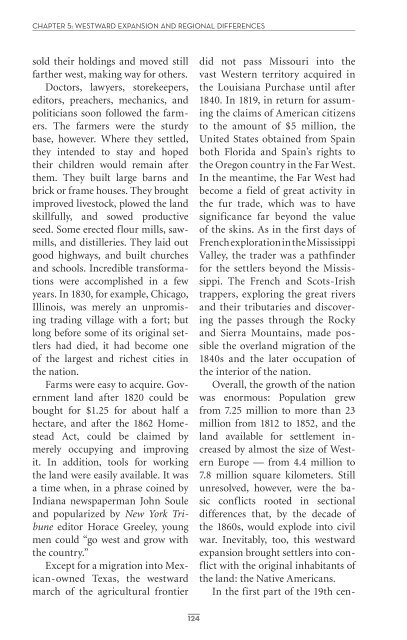s. history us history us history - Embassy of the United States
s. history us history us history - Embassy of the United States
s. history us history us history - Embassy of the United States
- No tags were found...
You also want an ePaper? Increase the reach of your titles
YUMPU automatically turns print PDFs into web optimized ePapers that Google loves.
CHAPTER 5: WESTWARD EXPANSION AND REGIONAL DIFFERENCESOUTLINE OF U.S. HISTORYsold <strong>the</strong>ir holdings and moved stillfar<strong>the</strong>r west, making way for o<strong>the</strong>rs.Doctors, lawyers, storekeepers,editors, preachers, mechanics, andpoliticians soon followed <strong>the</strong> farmers.The farmers were <strong>the</strong> sturdybase, however. Where <strong>the</strong>y settled,<strong>the</strong>y intended to stay and hoped<strong>the</strong>ir children would remain after<strong>the</strong>m. They built large barns andbrick or frame ho<strong>us</strong>es. They broughtimproved livestock, plowed <strong>the</strong> landskillfully, and sowed productiveseed. Some erected flour mills, sawmills,and distilleries. They laid outgood highways, and built churchesand schools. Incredible transformationswere accomplished in a fewyears. In 1830, for example, Chicago,Illinois, was merely an unpromisingtrading village with a fort; butlong before some <strong>of</strong> its original settlershad died, it had become one<strong>of</strong> <strong>the</strong> largest and richest cities in<strong>the</strong> nation.Farms were easy to acquire. Governmentland after 1820 could bebought for $1.25 for about half ahectare, and after <strong>the</strong> 1862 HomesteadAct, could be claimed bymerely occupying and improvingit. In addition, tools for working<strong>the</strong> land were easily available. It wasa time when, in a phrase coined byIndiana newspaperman John Souleand popularized by New York Tribuneeditor Horace Greeley, youngmen could “go west and grow with<strong>the</strong> country.”Except for a migration into Mexican-ownedTexas, <strong>the</strong> westwardmarch <strong>of</strong> <strong>the</strong> agricultural frontierdid not pass Missouri into <strong>the</strong>vast Western territory acquired in<strong>the</strong> Louisiana Purchase until after1840. In 1819, in return for assuming<strong>the</strong> claims <strong>of</strong> American citizensto <strong>the</strong> amount <strong>of</strong> $5 million, <strong>the</strong><strong>United</strong> <strong>States</strong> obtained from Spainboth Florida and Spain’s rights to<strong>the</strong> Oregon country in <strong>the</strong> Far West.In <strong>the</strong> meantime, <strong>the</strong> Far West hadbecome a field <strong>of</strong> great activity in<strong>the</strong> fur trade, which was to havesignificance far beyond <strong>the</strong> value<strong>of</strong> <strong>the</strong> skins. As in <strong>the</strong> first days <strong>of</strong>French exploration in <strong>the</strong> MississippiValley, <strong>the</strong> trader was a pathfinderfor <strong>the</strong> settlers beyond <strong>the</strong> Mississippi.The French and Scots-Irishtrappers, exploring <strong>the</strong> great riversand <strong>the</strong>ir tributaries and discovering<strong>the</strong> passes through <strong>the</strong> Rockyand Sierra Mountains, made possible<strong>the</strong> overland migration <strong>of</strong> <strong>the</strong>1840s and <strong>the</strong> later occupation <strong>of</strong><strong>the</strong> interior <strong>of</strong> <strong>the</strong> nation.Overall, <strong>the</strong> growth <strong>of</strong> <strong>the</strong> nationwas enormo<strong>us</strong>: Population grewfrom 7.25 million to more than 23million from 1812 to 1852, and <strong>the</strong>land available for settlement increasedby almost <strong>the</strong> size <strong>of</strong> WesternEurope — from 4.4 million to7.8 million square kilometers. Stillunresolved, however, were <strong>the</strong> basicconflicts rooted in sectionaldifferences that, by <strong>the</strong> decade <strong>of</strong><strong>the</strong> 1860s, would explode into civilwar. Inevitably, too, this westwardexpansion brought settlers into conflictwith <strong>the</strong> original inhabitants <strong>of</strong><strong>the</strong> land: <strong>the</strong> Native Americans.In <strong>the</strong> first part <strong>of</strong> <strong>the</strong> 19th century,<strong>the</strong> most prominent figureassociated with <strong>the</strong>se conflicts wasAndrew Jackson, <strong>the</strong> first “Westerner”to occupy <strong>the</strong> White Ho<strong>us</strong>e. In<strong>the</strong> midst <strong>of</strong> <strong>the</strong> War <strong>of</strong> 1812, Jackson,<strong>the</strong>n in charge <strong>of</strong> <strong>the</strong> Tennesseemilitia, was sent into sou<strong>the</strong>rn Alabama,where he ruthlessly put downan uprising <strong>of</strong> Creek Indians. TheCreeks soon ceded two-thirds <strong>of</strong><strong>the</strong>ir land to <strong>the</strong> <strong>United</strong> <strong>States</strong>. Jacksonlater routed bands <strong>of</strong> Seminolesfrom <strong>the</strong>ir sanctuaries in SpanishownedFlorida.In <strong>the</strong> 1820s, President Monroe’ssecretary <strong>of</strong> war, John C. Calhoun,pursued a policy <strong>of</strong> removing <strong>the</strong> remainingtribes from <strong>the</strong> old Southwestand resettling <strong>the</strong>m beyond <strong>the</strong>Mississippi. Jackson continued thispolicy as president. In 1830 Congresspassed <strong>the</strong> Indian Removal Act, providingfunds to transport <strong>the</strong> easterntribes beyond <strong>the</strong> Mississippi.In 1834 a special Native Americanterritory was set up in what is nowOklahoma. In all, <strong>the</strong> tribes signed94 treaties during Jackson’s twoterms, ceding millions <strong>of</strong> hectaresto <strong>the</strong> federal government and removingdozens <strong>of</strong> tribes from <strong>the</strong>irancestral homelands.The most terrible chapter in thisunhappy <strong>history</strong> concerned <strong>the</strong>Cherokees, whose lands in westernNorth Carolina and Georgia hadbeen guaranteed by treaty since1791. Among <strong>the</strong> most progressive<strong>of</strong> <strong>the</strong> eastern tribes, <strong>the</strong> Cherokeesnever<strong>the</strong>less were sure to be displacedwhen gold was discovered on<strong>the</strong>ir land in 1829. Forced to makea long and cruel trek to Oklahomain 1838, <strong>the</strong> tribe lost many <strong>of</strong> itsnumbers from disease and privationon what became known as <strong>the</strong>“Trail <strong>of</strong> Tears.” 9124125












